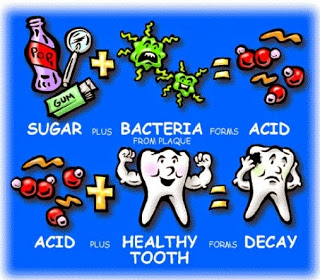Why cavities arent just for kids
 Tooth decay or cavities result from destruction of the tooth enamel and can lead to a range of problems from toothache to bad breath.
Tooth decay or cavities result from destruction of the tooth enamel and can lead to a range of problems from toothache to bad breath.
Cavities occur when foods containing carbohydrates (sugars and starches) such as milk, sugared drinks, cakes or candy are frequently left on the teeth.
Bacteria that live in the mouth thrive on these foods, producing acids as a result. Over a period of time, these acids destroy tooth enamel, resulting in tooth decay.
Many people associate cavities with children but the changes that occur with aging make cavities an adult problem, too.
Recession of the gums away from the teeth, combined with an increased incidence of gum disease, can expose tooth roots to plaque.
Tooth roots are covered with cementum, a softer tissue than enamel. They are susceptible to decay and are more sensitive to touch and to hot and cold. The majority of people over age 50 have tooth-root decay.
Decay around the edges of fillings is also common to older adults. As many of them did not benefit from fluoride and modern preventive dental care when they were younger, they often have a number of dental fillings.
Over the years, these fillings may weaken, fracture and leak around the edges.
Bacteria accumulate in these tiny crevices causing acid to build up which leads to decay.
You can help prevent tooth decay by following these tips:
- Brush twice a day with fluoride toothpaste
- Clean between your teeth daily with floss or interdental cleaner
- Eat nutritious and balanced meals and limit snacking
Its also worth asking your dentist about supplemental fluoride, which strengthens your teeth, and about dental sealants, a plastic protective coating which is applied to the chewing surfaces of the back teeth to protect them from decay.
In addition, its important to visit your dentist regularly for professional cleanings and oral examination.
How the food you eat can cause tooth decay
 When you put food in your mouth, it immediately meets the bacteria that live there.
When you put food in your mouth, it immediately meets the bacteria that live there.
Plaque, for example, is a sticky film of bacteria.
These bacteria love the sugars found in many foods. So, when you don’t clean your teeth after eating, the bacteria and the sugar can combine to produce acids which can destroy the enamel – the hard surface of the tooth.
In time, this can lead to tooth decay. The more often you eat and the longer foods are in your mouth, the more damage occurs.
Many foods that are nutritious and important in our diet contain sugars – such as fruits, milk, bread, cereals and even vegetables.
So the key is not to try and avoid sugar but to think before you eat.
When you eat is also important because each time you eat food that contains sugars, the teeth are attacked by acids for 20 minutes or more.
This means that foods that are eaten as part of a meal cause less harm. More saliva is released during a meal, helping to wash foods from the mouth and reduce the effects of acids.
Here are some tips to follow when choosing your meals and snacks.
- Eat a variety of foods from different food groups
- Limit the number of snacks that you eat
- If you do snack, choose nutritious foods, such as cheese, raw vegetables, plain yogurt, or a piece of fruit
Its also important to brush your teeth twice a day and to clean between your teeth daily with floss or interdental cleaners.
And of course regular visits to your dentist will help prevent problems from occurring and catch those that do occur while they are easier to treat.